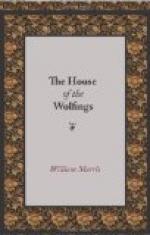“O house of the heart of the mighty, O breast of the battle-lord Why art thou coldly hidden from the flickering flame of the sword? I know thee not, nor see thee; thou art as the fells afar Where the Fathers have their dwelling, and the halls of Godhome are: The wind blows wild betwixt us, and the cloud-rack flies along, And high aloft enfoldeth the dwelling of the strong; They are, as of old they have been, but their hearths flame not for me; And the kindness of their feast-halls mine eyes shall never see.”
Thiodolf’s lips still smiled on the old man, but a shadow had come over his eyes and his brow; and the chief of the Daylings and their mighty guests stood by listening intently with the knit brows of anxious men; nor did any speak till the ancient man again betook him to words:
“I came to the house of the foeman when hunger made me a fool; And the foeman said, ‘Thou art weary, lo, set thy foot on the stool;’ And I stretched out my feet,—and was shackled: and he spake with a dastard’s smile, ‘O guest, thine hands are heavy; now rest them for a while!’ So I stretched out my hands, and the hand-gyves lay cold on either wrist: And the wood of the wolf had been better than that feast-hall, had I wist That this was the ancient pit-fall, and the long expected trap, And that now for my heart’s desire I had sold the world’s goodhap.”
Therewith the ancient man turned slowly away from Thiodolf, and departed sadly to his own place. Thiodolf changed countenance but little, albeit those about him looked strangely on him, as though if they durst they would ask him what these words might be, and if he from his hidden knowledge might fit a meaning to them. For to many there was a word of warning in them, and to some an evil omen of the days soon to be; and scarce anyone heard those words but he had a misgiving in his heart, for the ancient man was known to be foreseeing, and wild and strange his words seemed to them.
But Agni would make light of it, and he said: “Asmund the Old is of good will, and wise he is; but he hath great longings for the deeds of men, when he hath tidings of battle; for a great warrior and a red-hand hewer he hath been in times past; he loves the Kindred, and deems it ill if he may not fare afield with them; for the thought of dying in the straw is hateful to him.”
“Yea,” said another, “and moreover he hath seen sons whom he loved slain in battle; and when he seeth a warrior in his prime he becometh dear to him, and he feareth for him.”
“Yet,” said a third, “Asmund is foreseeing; and may be, Thiodolf, thou wilt wot of the drift of these words, and tell us thereof.”
But Thiodolf spake nought of the matter, though in his heart he pondered it.




